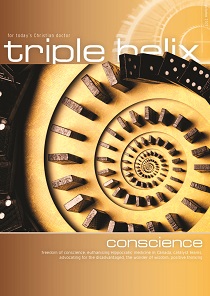Lament at sin and its effects as the impetus for advocacy
Advocacy always springs from lament. As our hearts are grieved by suffering, injustice and the chaos and confusion of our fallen world, we yearn for change and long for what is better.
There has been a tendency among evangelical Christians, particularly in North America, Europe, and Australasia, to focus on personal salvation through Christ's atoning death, his resurrection, and the coming of the Holy Spirit into the believer's life. For the individual believer, the penalty of sin is paid, the power of sin is overcome, and when with Christ for eternity, the presence of sin will be no more.
However, it is clear from the Bible that God is concerned not just with the individual's own sin but with the impact of sin on the whole created order and on the lives of those who are sinned against. Those who love and serve him must inevitably share in his grief and yearning.
If we share in God's grief at the lies, injustice, and violence in our world, we surely cannot be silent or collude with these. We have a responsibility to speak up to those with power and influence whose actions or inactions result in the suffering of the oppressed and exploited.
A historical recognition of the responsibility for advocacy
We need to grasp our role as individual Christians, churches, and Christian agencies in advocacy.
A sense of responsibility for both serving the poor and speaking up regarding the underlying injustices that cause, maintain, and deepen their poverty characterised many Christians in the 18th and 19th centuries. They were motivated and sustained by their faith in Christ and their experience of his protection and guidance in their work. Some of their names are still familiar today. John Newton and William Wilberforce were well-known for their campaigning against the transatlantic slave trade. Elizabeth Fry worked on behalf of women prisoners and their children and for prison reform. Sojourner Truth risked her life to advocate for the abolition of slavery and the rights of African Americans and women. Lord Shaftesbury fought for proper treatment of the mentally ill and to replace child labour with education. Harriet Tubman escaped slavery and spent the rest of her life leading hundreds of slaves to freedom and fighting for abolition. Charles Finney, an American pastor and evangelist, stood against racism and slavery and for women's rights.
In the late 19th and early 20th centuries, however, evangelical leaders in the USA and the UK separated evangelism from social action and social justice, a change coined 'The Great Reversal'. This was apparently due to concern that liberal theology had created a social gospel that denied the need for personal repentance and faith. However, this change in perspective fitted conveniently with a more individualistic approach that tended to focus more on personal morality and less on responsibility for our neighbour.
There has been a renewal of awareness of responsibility for social action and social justice among evangelical Christians in western nations over the past fifty years. This has been expressed in consensus documents, including the Lausanne Covenant (1974), [1] 'An Evangelical Commitment to Simple Lifestyle' (1980), [2] ' Transformation: the church in response to human need' (1983) [3] and the Micah Declaration (2001). [4]
'...work among the poor must embrace work on the causes of their poverty. Often these causes have to do with structural injustice and the abuse of power...This should be no surprise to those with a biblical doctrine of sin, for sin is deep and pervasive. It is both personal and structural…we are discovering afresh the Bible's condemnation of social injustice and its call to speak up for the oppressed.' [5]
The Bible's teaching as the basis for advocacy
It is impossible to read the Bible without a sense of responsibility to the poor and disadvantaged. The New Testament writers take for granted their readers' knowledge of the Old Testament. God commanded his people Israel throughout their history to defend, protect and support the poor, the orphan, the widow and the stranger. [6] Those who oppress and exploit the vulnerable or show indifference to their suffering are under his judgement. [7] Those who belong to Christ, whether Jew or Gentile, are no longer under the Old Testament ceremonial law but are still under the moral law. [8] Jesus commanded his disciples to do good. The New Testament writers constantly remind their readers of this. [9] Love always delights and rejoices in truth and justice. [10] God's people who have influence are specifically commanded to speak out on behalf of the voiceless. [11] They should not be surprised when their concern for the disadvantaged makes them unpopular. [12]
Personal discipleship to Christ as the foundation of advocacy
The letter of James, the brother of Jesus, causes us to reflect on our own lives and how we respond to poverty, discrimination, and oppression.
Response to God's Word
We must humbly accept the Word of God, which rescues us from self-righteous, hypocritical anger and must constantly loath and repent of our own sin, especially of evil and foolish words which make our claim to be a Christian worthless, (James 1:19-26, 3:1-12, 4:7-10).
Reality of faith
We must demonstrate our faith's genuineness and wisdom by giving humble, practical help and comfort to those in need, striving for peace, being teachable, considerate, and impartial and refusing to align ourselves with godlessness (James 1:26-27, 2:14-26, 3:13, 17-18).
Repentance from self-interest
Not all complaint is correct in God's eyes. Fighting our own corner, envy, nationalistic or ethnic pride, and the pursuit of power and prestige are all demonic and bring disorder (James 3:14-16, 4:1-6). God will judge a grumbling, complaining attitude (5:9) and any lack of integrity or transparency (5:12).
Rest and trust in God in suffering
When we ourselves suffer, are oppressed, or exploited, we are to demonstrate patience, determination, and contentment, looking forward to Jesus' return, confident in the Lord's compassion and mercy, prayerful, thankful, and living in supportive and honest fellowship (James 5:7-11).
Riches are a danger
The Bible's words should always be uncomfortable for those of us who have wealth. We can easily be presumptuous, self-confident, and arrogant (James 4:13-17). God is not blind to the exploitation of the poor that sustains our lifestyles (5:1-6). Showing partiality in our lives and churches towards those with wealth, power and influence will incur his wrath. We must not lord it over others (2:1-13).
Conclusion
As Christians, God calls us to share his heart as revealed in his Word for the poor, vulnerable, and oppressed. He calls us to speak for others while not being surprised when we suffer and are excluded in this world.
Our awareness of our own need for a Saviour, our commitment to Jesus Christ as Lord, our dependence on him in our vulnerability and pain, and our confidence in his coming Kingdom, enable us to have a distinctive approach to the evil and suffering in our world.
As we see the need of our fellow human beings, we identify with them in humility rather than being indifferent to their plight. We grieve and repent as we become aware of how our lifestyle or actions contribute to their suffering. We plead with God on their behalf, coming to him broken by their anguish and loss. We speak up for them with courage to those who have the authority to change their situation. We follow the crucified Saviour and relinquish any claim on worldly influence or power, rejoicing in the expectation that when Christ returns, the meek will inherit the earth.
Becky Macfarlane is a GP in Glasgow who is actively involved in caring for the health needs of asylum seekers and refugees. She is Chair of the CMF Global Advocacy Group
CMF's Global Advocacy Group has produced a resource on advocacy in global health called The Advocacy Journey, which was published in October 2021. See cmf.org.uk/bookstore to order a copy.
































